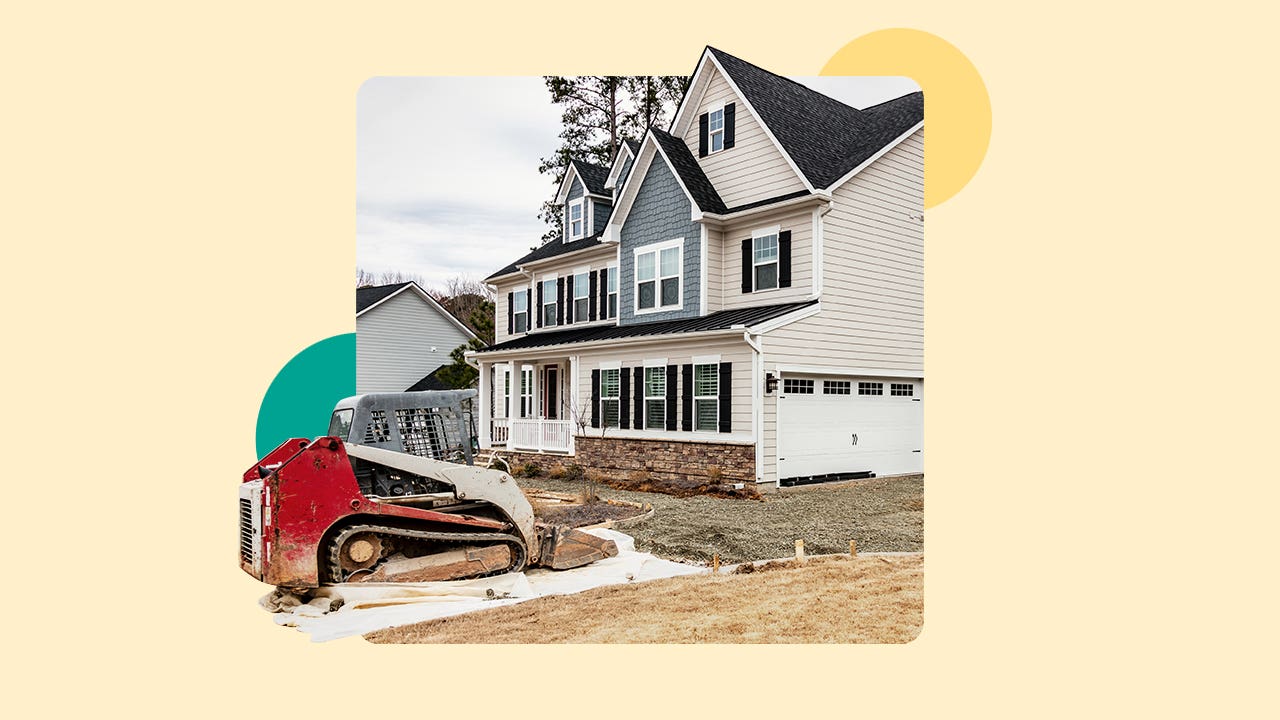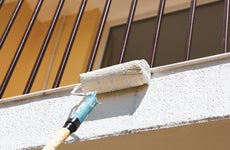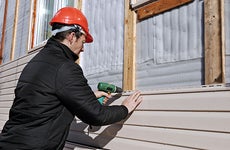What does a driveway cost?

The Bankrate promise
At Bankrate we strive to help you make smarter financial decisions. While we adhere to strict , this post may contain references to products from our partners. Here's an explanation for .
Key takeaways
- The average cost to install a driveway runs around $4,500-$5,100.
- Resurfacing a driveway is often cheaper than replacing one.
- Labor costs generally make up about half of the driveway project’s overall price.
- Asphalt and concrete are more affordable driveway materials than rubber and pavers.
If you own a car and a house, odds are you have a driveway. And it’s worth investing in a quality one, not only to save wear and tear on your wheels, but also to enhance the curb appeal of your home.
The average cost to install a driveway (the standard 24’ x 24’) runs around $4,500 to $5,100, according to contractor search service sites like HomeAdvisor and Fixr.com. But it can be anywhere from $1,000 to $13,000, depending on the driveway’s size, shape and the materials it’s made of. Factors such as the driveway’s slope, accessibility and the grade of the land will also affect the overall price.
Here’s what you need to know about driveway costs and what influences them.
How do materials affect a driveway’s cost?
Driveway prices are generally quoted per square foot, with $2 to $15 per being the typical range. The most important factor influencing the price of a driveway is the material you use. Driveways are generally made from asphalt, concrete, gravel or pavers, like brick or stone.
Asphalt
Asphalt, aka “blacktop,” is one of the most popular driveway materials, especially in northern or other cold climates — it tends to soften in extreme heat, so southerners often stay away from it. A mixture of sand and stone, held together by tar (hence the nickname), it’s cheap (about $3-7 per square foot), can be installed relatively quickly, and is pretty easy to maintain, lasting around 20 years.
Concrete
The other big driveway mainstay, concrete is also a mixture of sand and stone, only the binding agent is cement. While more expensive than asphalt ($4-8 per square foot), it’s also more long-lasting — up to 40 years — though it can crack or buckle in freezing weather or under lots of snow, sleet and ice, which is why it’s preferred for warm-weather regions. While it sounds industrial, concrete can be quite versatile in appearance, stamped or stained in different colors. The cons are that concrete is heavy, and requires a lot of time to install and set before it can be driven on.
Gravel
Gravel is a go-to for those on a budget: The cheapest driveway material ($1-3 per square foot), it’s basically a bunch of pebbles dumped and spread around, and it can last for 50 or more years. It’s pretty low-tech to deal with, but you do have to maintain it — periodically replacing and re-arranging the gravel, as wind and rain and cars can move it around.
Pavers: Brick/Stone
A driveway paved with brick, cobblestone or other rocks always makes for a classy look, and is especially attractive if you have a historic (or historic-looking) home. But it’s expensive — as much as $10-30 per square foot. It’ll be labor-intensive to install, too, as much needs to be done by hand. But pavers last for decades, sometimes as long as a century, and don’t require much maintenance. They can be laid in a variety of patterns, suiting driveways of different designs and shapes; plus, they’re easy to repair — you can just replace individually cracked or dislodged pieces, rather than having to redo the whole driveway.
Grass
There’s no need to keep off the grass with this sort of driveway: a system of interlocking concrete or plastic pavers with soil and seeds planted in between or on top (the pavers can be as prominent or hidden as you like). Ideal for rainy climes or places where water pools, grass driveways cost on average $10-$15 per square foot, and can even be installed DIY. While this type of drive may look charming, keep in mind that it will require regular maintenance, just like you do a lawn. You’ll need to trim the grass and keep it irrigated.
Rubber
Rubber can be an eco-friendly option for repaving a driveway — if you use recycled rubber from tires, as most driveways do. The material can be poured over asphalt or concrete at $10-$25 per square foot, though sometimes even as low as $6 per square foot. Rubber wins praise for being strong, flexible and extremely low maintenance. But it does require careful attention to drainage because it’s a non-porous surface, and it may not be the most long-lasting of surfaces, especially in a high-traffic driveway.
| Material Type | Average Cost (installed) | Characteristics |
|---|---|---|
| SOURCE: HomeAdvisor | ||
| Concrete | $3,900 | Can crack in freezing temps; long-lasting; affordable |
| Asphalt/Blacktop | $4,700 | Can get gooey in heat; less long-lasting; affordable |
| Gravel | $1,500 | Easy to displace; very affordable; long-lasting |
| Brick/Stone Pavers | $6,000 | Can crack or shift; expensive; very long-lasting |
| Rubber | $9,000 | Eco-friendly & easy to maintain; expensive; less durable |
| Grass | $6,000 | Attractive; needs weekly maintenance |
What other factors influence a driveway’s cost?
While the material is a key factor, the cost of labor is also one of the largest expenses when installing a driveway. Then there are extra features, and the consideration of whether the driveway is brand new or a replacement.
Labor costs
Labor costs generally make up about half of the driveway project’s overall price. Of course, the workers’ time largely depends on the driveway type — some materials require more skill or effort to install than others. For example, asphalt commands higher labor costs than concrete does. So, while concrete itself is generally more expensive than asphalt, the total tab for an asphalt driveway might actually be higher.
Other factors influencing laborers’ efforts is the driveway’s length, shape and design — if you want fancy curves or semi-circles, it could significantly affect its cost, increasing it by 10 to 30 percent, says HomeAdvisor. Whether the land needs to be leveled or cleared ahead of time also adds to the tab.
In some places, driveways require permits to build, and a contractor would pass on the cost of obtaining them to you.
Extra features
Want to heat your driveway, so you don’t have to shovel snow or deal with ice? Fine, but it’ll cost you — typically, around $12 to $25 per square foot; an average one is around $11,000, according to HomeAdvisor.
And would you like some gates to guard your driveway’s entrance? Figure on $4,000 to install those, Fixr.com says.
New vs replacement driveway
It’s cheaper to install a brand-new driveway than to replace an existing one. That’s because you’ll pay the full price of the new driveway, plus an additional $1 to $2 per square foot for workers to tear up the old one and cart away the debris.
While the labor is expensive, building or replacing a driveway is not recommended for DIYers. There’s just too much specialized work and heavy equipment involved, except for the grass variety. If you have an aging asphalt driveway, you might be able to resurface it yourself, though.
How much does it cost to replace a driveway?
There are two steps for completely replacing a driveway. First, you’ll need to demolish and remove the materials from the old drive. According to HomeAdvisor, this part of the process runs between $2-$6 per square foot on average.
The cost to install the new driveway can between $1,000 to $13,000, depending on factors like which materials you use and how long it takes to complete. Changing the shape and the length can make the replacement more expensive.
Replacing vs resurfacing a driveway
Resurfacing a driveway is substantially less expensive than replacing it in many cases. When you resurface your drive you only have to apply a top layer of new material without any demo and material disposal costs. You may also be required to prepare the driveway before it’s resurfaced. All told, though, HomeGuide says resurfacing an asphalt driveway is just $1-$3 per square foot.
When is the best time to build a driveway?
Obviously, not in rainy seasons or the dead of winter. As long as you can avoid April showers, spring is a good time, as is autumn, before the earth starts to harden. You want it warm but dry, so early summer — before the humidity and extreme heat kicks in — can be a good time to begin a driveway project too.
Related Articles



